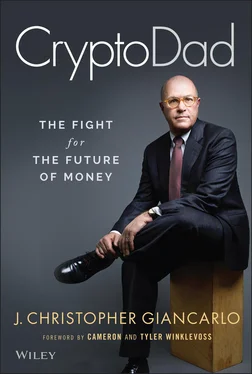In 2005, I directed GFI's highly successful initial public offering (IPO). The next year, we conducted our secondary offering and completed a major acquisition. By 2008, GFI had grown to 18 offices around the world and was generating record revenue. We operated the trading platforms on which most of the world's credit default swaps were traded.
Then the 2008 financial crisis hit. Panic had been building steadily in financial markets since the demise of Bear Stearns that March. A double bubble had burst of housing prices and consumer credit, as lenders became concerned that falling residential and commercial property values would imperil repayment of mortgages. An extraordinary “run on the bank” ensued with rapidly falling asset values preventing US and overseas lenders from meeting their cash obligations. That marked the beginning of a financial crisis that was devastating for far too many businesses and families. 3
On Wall Street, concern was rife about imminent failure of the world's largest investment and commercial banks. Tension was rising on our broking floor as summer waned and our front office staff worked under greater stress to maintain orderly markets. Mortgage companies Fannie Mae and Freddie Mac were placed under federal conservatorship to the tune of $187 billion and the Fed lent over $180 billion to bail out AIG. The storm was upon us and GFI was at its center.
In early September, a senior official at the New York Federal Reserve Bank called us. He was asking about the CDS trading exposure of several major banks, including Lehman Brothers. By then, trading conditions were deteriorating by the hour. It became clear that the regulator had little means, short of frantic telephone calls to firms like ours, to read all the danger signals that derivatives trading markets, especially CDS markets, were broadcasting.
In late September, Treasury Secretary Henry Paulson and Fed Chair Ben Bernanke submitted a $700 billion bailout package to Congress to stave off almost certain collapse of the global financial system. Yet, the damage had been done. The United States and, indeed, the world were entering the Great Recession, the worse financial calamity since the Great Depression eight decades earlier.
In 2009, the G-20 governments met in Washington and later in Pittsburgh to formulate a collective response to the crisis. Among the many steps proposed were reforms for swaps markets. These included moving bilaterally cleared swaps into central counterparty clearinghouses, increasing counterparty risk transparency, and executing swap transactions on regulated platforms.
As I've said, these were appropriate reforms. Indeed, the first two were innovations toward which the market was already moving on its own, while the third one just made common sense.
Speaking with my GFI colleagues, I argued that these reforms were not only inevitable, but they also would be good for financial swaps markets. I was concerned, however, that clumsy enactment and implementation of these reforms could minimize their benefits. It was essential that the interdealer brokers be heard as the legislation was crafted and implemented.
With the keen support of Gooch and GFI's savvy CEO, Colin Heffron, I organized a government relations effort for the firm in the summer and autumn of 2009. I hired a well-regarded Washington lawyer, Mike Gill, and made several trips to Washington to meet with members of key House and Senate committees on financial services and agriculture. It did not take me long to come to the view that individual action by GFI and each of its interdealer broker competitors would be inefficient or worse. A better course would be collective action by the five largest firms (or “the five families,” as we sometimes jokingly called ourselves). We decided to form a US trade association: the Wholesale Markets Brokers Association Americas (WMBAA). 4
WMBAA launched over lunch in late 2009 at a private dining club in the historic India House on Hanover Square, just off Wall Street. Chris Ferreri, a seasoned executive with natural presence and command, was voted the first president. Serving with Ferreri on the board were Bill Shields, GFI's sharp-eyed chief of compliance; Julian Harding, a smart, cultured and elegant Brit who had founded one of the first electronic foreign-exchange options brokerages; Sean Bernardo, a Jersey boy who was smart to the ways of Wall Street; Steve Merkel, a demanding and brilliant lawyer; and me. Our Washington guide and counselor was Micah Green, 5 whose charm, self-confidence, and determination would open many doors. The WMBAA was thus born.
And not a moment too soon. The Barney Frank–chaired House Financial Services Committee was moving fast with a bill that would eventually make its way into the Dodd–Frank Act. A section of the bill that would become Title VII dealt with swaps products. It contained four operative mandates: registration of swaps dealers and major swap participants, channeling of more bilateral swaps transactions into central counterparty clearinghouses, increasing counterparty risk transparency, and execution of swap transactions on regulated platforms.
Over the winter and spring of 2010, our merry band discussed the draft legislation in countless calls and trips to Washington. I testified before Congress several times as a swaps market expert. In July 2010, Dodd–Frank was passed into law. As the then president of the WMBAA, I issued a public statement commending President Obama and Congress for passage. I believed then and believe now that Congress got the swaps reform provisions of Dodd–Frank right.
Over the next several years, the CFTC under Chairman Gary Gensler set about rapidly implementing Dodd–Frank's swaps mandates. In January 2013, CFTC Commissioner Jill Sommers, a Republican, announced her intention to leave the agency. Not long after, I was contacted by staff for Senate Minority Leader Mitch McConnell asking if I was interested in being recommended to the Obama administration to replace Sommers. After a lot of thought and discussion with Regina, I said yes.
The 14 years I spent with GFI were some of the most satisfying years of my life. I owed a great deal to Mickey Gooch, Colin Heffron, and so many great GFI colleagues. I also owed a lot to my WMBAA colleagues for the work that got me noticed and considered for service at the CFTC. And, of course, I owed everything to Regina, who once again gave her blessing to a new and unanticipated adventure.
As I said goodbye to GFI, my business colleagues held a rousing going-away party for me at my favorite Wall Street restaurant, Delmonico's. 6 At one point, I left the party to go to the men's room. As I passed through the bar, a young man came up to me to wish me well. He said, “You probably don't remember me, but I was the guy dancing on the corner 14 years ago.” I asked what he was doing now. He said he was the number two guy on JPMorgan's fixed income trading desk in North America. Clearly, he had learned his lessons well.
In August 2013, President Obama announced my nomination. The following March, I testified before the Senate Agriculture Committee alongside fellow CFTC nominees Tim Massad and Sharon Bowen. After Senate confirmation, I was sworn in on June 24, 2014, by Supreme Court Justice Clarence Thomas in a moving ceremony in the House Agriculture Committee Hearing Room overlooking the Capitol. In addition to many friends and family members, the attendees included Senator Rob Portman of Ohio, House Agriculture Committee Chairman Frank Lucas, Congressmen Mike Conaway and Scott Garrett, and my new colleagues, CFTC Chairman Massad and Commissioner Bowen.
I began by thanking Justice Thomas and the other distinguished guests. I then thanked my mother and father and three brothers—all gathered for the first time in decades and, as it turned out, for the last time ever. I thanked Regina for her love and support and the gift of our three children, Emma, Luke, and Henry.
Читать дальше












